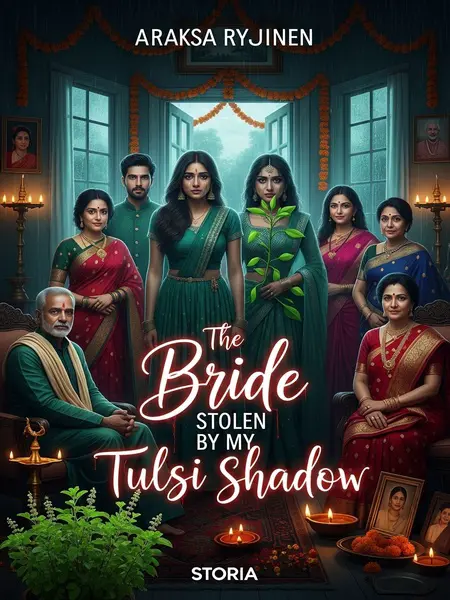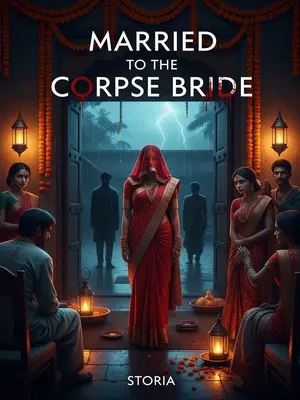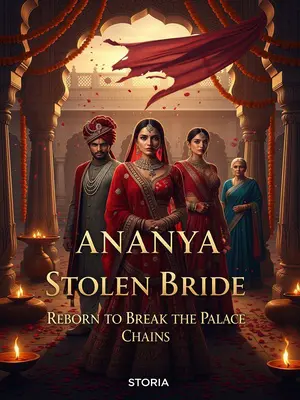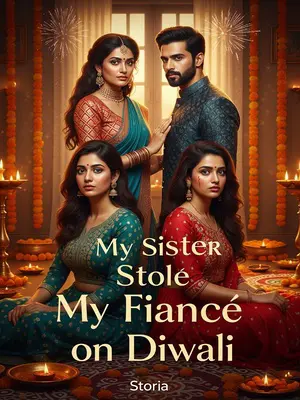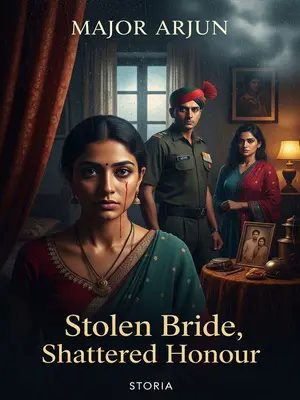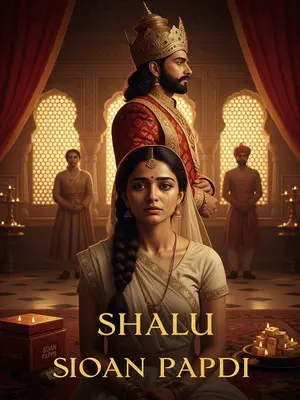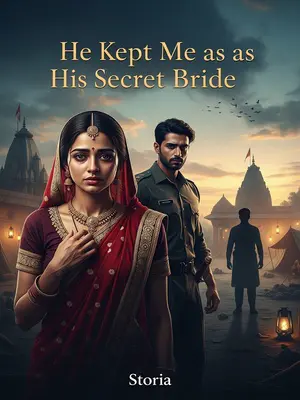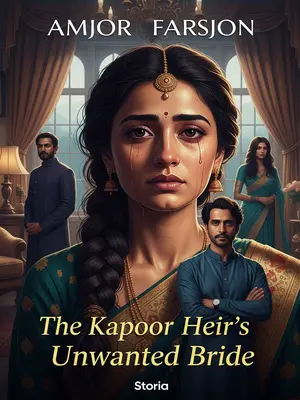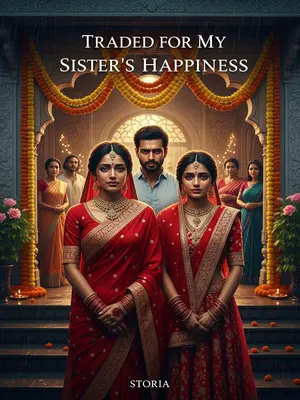Chapter 6: Homecoming
That night, Tulsi sent someone to invite Arjun back to the bedroom.
She fussed over her saree, dabbed on more perfume, and arranged her hair just so, her anticipation obvious.
Arjun refused again.
His reply was polite, but distant. “I have some paperwork to finish. You should rest, Riya.”
“My wife is not yet recovered. Consummation might affect your health. There’s no rush—we have plenty of time.”
His voice was gentle, almost apologetic. He gave her a reassuring smile, then closed the door softly behind him.
Tulsi was a little disappointed, but joy soon won out.
She pouted for a moment, but then her face brightened. She admired herself in the mirror, turning this way and that, pleased with what she saw.
“Husband is so considerate—he truly loves me deeply.”
She whispered it to her reflection, hugging herself. The words sounded strange coming from my lips.
I looked at her coldly, only hoping that tomorrow, when we returned home, Papa, Ma, and Bhaiya would see through this impostor and avenge me.
I prayed with all my might, calling out to every god and ancestor whose name I knew. Tomorrow, I thought, would bring the truth to light.
On the third day after the wedding, Tulsi was very excited, rising early to dress and not forgetting to show off to me.
She twirled in front of the mirror, the gold borders of her saree glinting in the sunlight. Her laughter rang through the room, bright as temple bells. “See, Riya? Today is my day.”
“I’m going to see Papa, Ma, and Bhaiya. I’m so happy.”
She chattered as she dressed, rehearsing what she would say, how she would greet everyone. Her excitement was infectious, but it filled me with dread.
“I wonder if they miss me?”
She paused, eyes shining, a hint of mischief in her voice. “They must, na? How can they not?”
“Of course they do—after all, I’m their only daughter.”
Her tone was both mocking and triumphant. She spun around, pallu swirling, basking in the anticipation.
“The only one.”
She looked at me in the mirror, her eyes cold and victorious. I felt a chill run through me.
The car was ready, and Arjun helped Tulsi into it.
The white Ambassador gleamed in the morning sun, festooned with marigold garlands. The driver opened the door, and Arjun offered his hand, steadying her as she climbed in. The neighbours peeked from their verandahs, smiling and whispering.
The old chaiwala across the street paused, wiping his hands on his gamcha, and called out a blessing.
“Very happy?” Arjun asked casually.
He adjusted the fold of her saree, his voice calm. There was an unreadable look in his eyes.
“Of course! It’s the first time I’ve gone so long without seeing them—it feels strange.”
She bounced in her seat, excitement barely contained. She looked out the window, pointing out familiar shops and landmarks as the car wound through the old city streets.
She chattered about trivial childhood memories with my family—some even I barely remembered.
Her voice was full of laughter, recounting tales of school picnics, monsoon floods, Ma’s homemade pickles. Even I was surprised by how much she remembered.
Back then, I was frail and rarely went out, didn’t like attending kitty parties, had no friends, and when bored, only chatted with Tulsi in the courtyard.
It was true. My world had always been small, revolving around home, family, and the tulsi plant in the courtyard. My secrets, my dreams—all were whispered to her as I watered her roots every morning.
I told her everything—from Ma’s best coconut barfi to the bouquet Bhaiya picked for me when he went out.
Every joy, every sorrow, every silly childhood game—I had poured them all out to her, never imagining she was listening so closely.
All of it, in detail.
Every gesture, every word, every routine—she had memorised it all, using it now as her armour.
Who would have thought, it only helped her in the end.
I felt a sharp pang of regret, wishing I could take it all back. My innocence had been my undoing.
Arjun listened silently, occasionally smiling, but said little more.
He leaned back in his seat, arms crossed, eyes thoughtful. He watched Tulsi, his expression unreadable.
Always that same preoccupied look.
A furrow appeared between his brows, his gaze often wandering to the window. He seemed lost in thought.
Was he always like this?
I wondered if I had ever truly known him, or if I had only seen what I wanted to see.
I didn’t know.
The car rattled over a pothole, and Tulsi laughed, recalling how Papa used to scold the municipality about the roads. I realised I had missed so much—about him, about myself.
It seemed I never truly understood this childhood friend.
Even in death, I was learning new things. Life is strange, I thought—how little we know those closest to us.
...
In front of the Sharma bungalow, the car slowed to a stop.
The gate was decorated with mango leaves and marigolds, remnants from the wedding day. The old watchman opened the gate, grinning broadly.
The window rolled down, revealing a young, handsome face.
He wore a crisp white kurta, his hair neatly combed. His smile was wide, his eyes bright with excitement.
He smiled brightly, joy lighting up his eyes and brows.
Bhaiya’s laughter rang out, deep and infectious, echoing through the courtyard. He waved, his hand raised high.
I was stunned—that was…
For a moment, I forgot I was dead. My heart skipped a beat. Bhaiya—my dearest Bhaiya.
“Bhaiya!”
The word escaped me, though I knew he could not hear. Tulsi leapt from the car, her arms outstretched.
Tulsi, like a bird returning to its nest, bounced into Bhaiya’s arms.
She laughed, burying her face in his shoulder, her voice muffled by his kurta. He held her tightly, rocking her gently.
He caught her, not at all annoyed, but instead protectively embraced her, afraid she would fall.
His arms formed a safe cocoon around her. He fussed over her, checking her hair, her jewellery, his face creased with concern and affection.
“Little girl, already married and still so unruly—how do you look like a Sharma family daughter?”
His tone was mock-stern, but his eyes sparkled with mischief. The old teasing was back, the bond unbroken.
Bhaiya spoke sharply, but his eyes smiled, not a hint of reproach.
He pinched her cheek, and she squealed, pretending to protest. They fell into easy banter, just as we always had.
“Riya missed Bhaiya so much. Where’s the hairpin you promised me? You didn’t forget, did you?”
She pouted, batting her eyelashes, her tone coaxing. Bhaiya laughed, ruffling her hair.
“How would I dare? I prepared it long ago. I’ll give it to you in a moment.”
He pulled a small box from his pocket, brandishing it like a prize. Tulsi’s eyes widened in delight.
I floated in the air, dazedly watching this scene, my eyes aching with longing.
The ache in my chest grew sharper. I wanted to reach out, to touch Bhaiya’s face, to feel the warmth of his embrace one last time.
Bhaiya was still so gentle—but that wasn’t me…
It was Tulsi in his arms, her laughter filling the courtyard. My place, my family, my life—taken from me so easily.
“Cough, cough, cough.” I heard the familiar cough and looked toward the newcomer.
The sound was unmistakable—Papa’s trademark cough, deep and throaty, followed by a grumble about the morning air.
“Papa…” I floated to him, calling anxiously.
His face was thinner, the lines around his mouth deeper. He looked tired, but his eyes still held that familiar spark.
But Papa walked right through me, going to Tulsi and complaining, “Hmph, you only have eyes for your Bhaiya.”
He feigned annoyance, crossing his arms. But his lips twitched with a suppressed smile.
“No, I miss Papa too! Don’t be angry with Riya.”
She grabbed his hand, swinging it playfully. Papa tried to look stern, but he melted almost immediately.
She spoke sweetly, shaking Papa’s arm, making him want to spoil her even more.
He hugged her, muttering, “Bas, bas, ab theek hai. My little girl has become too clever.”
Papa laughed heartily, but to me, it sounded unbearably harsh.
Each laugh was a knife, twisting in my heart. They loved her, not knowing what had happened to me.
I wanted to tear Tulsi’s hand from Papa’s arm, to keep this spirit away from my family.
I reached out, but my hand passed through his kurta. Helpless, I watched as he showered affection on the wrong daughter.
“Papa, I’m here. Papa!”
My voice echoed through the courtyard, unheard by anyone but the crows perched on the neem tree.
“She’s not Riya. I’m Riya. Papa, look at me—I’m right here!”
I pleaded, sobbed, screamed. No one looked up. My cries dissolved into the morning air.
But Papa only glanced past me, looking at Arjun, who stood quietly watching.
He nodded at Arjun, a silent gesture of gratitude and acceptance.
“Thank you for taking care of Riya.”
His voice was thick with emotion. He clapped Arjun on the back, drawing him into the family circle.
Arjun nodded. “Uncle, you’re too polite. Riya is my wife—I will naturally protect her.”
His words were formal, but there was a note of sincerity that made Papa smile.
Papa was satisfied and pulled Arjun into the house.
He draped an arm over Arjun’s shoulder, leading him inside with the pride of a father welcoming his own son.
As soon as we entered the courtyard, Ma appeared.
She stood by the tulsi chabutra, her saree pallav fluttering in the breeze. Her eyes searched the crowd, settling on Tulsi with a look of pure relief.
A gentle and elegant woman stood under the porch, her eyes full of longing and hope.
Ma’s hair was streaked with silver, her face drawn but beautiful as ever. She pressed her hands together in silent prayer, tears glistening in her eyes.
Just one look, and my heart ached.
Every childhood memory rushed back—her lullabies, her stories, her hands soothing my fevers. I wanted to run to her, to bury my face in her lap.
My Ma—she had lost weight.
Her saree hung loose, her wrists seemed bonier. She looked older, frailer, worry etched deep in her face.
She looked haggard.
I noticed the dark circles under her eyes, the way she clutched her pallu, as if searching for comfort.
She must have missed me terribly, worried my in-laws wouldn’t like me, afraid I wasn’t eating or sleeping well, suffering grievances far from home.
I remembered the long talks we’d had before the wedding, her advice, her reassurances. She had loved me fiercely, protectively.
Unable to hold back, I rushed to her—only to see her already hugging Tulsi with a smile.
She gathered Tulsi into her arms, sobbing with relief. The two clung to each other, Ma’s tears soaking the edge of Tulsi’s saree.
Her eyes were full of love.
The love I had known all my life. I felt a pang of jealousy, sharp and bitter.
“Ma, Riya missed you so much.”
Tulsi pressed her face to Ma’s shoulder, her voice trembling with emotion.
“Good Riya, Ma missed you too. Let Ma take a good look at you.”
Ma cupped Tulsi’s face in her hands, studying her features as if to memorise them. Her tears fell unchecked, soaking into Tulsi’s skin.
Ma stroked Tulsi’s face, shedding a few tears.
She dabbed at her eyes with the edge of her saree, smiling through the tears. The old, familiar gesture brought a fresh ache to my heart.
“Is it good at Arjun’s house? Did you get into trouble? You should learn more about managing the house from your mother-in-law. Arjun is busy, don’t always trouble him.”
Her voice was soft, worried. She fussed over Tulsi, checking her bangles, tucking a stray hair behind her ear.
“All right, I know. I haven’t always troubled him. If you don’t believe me, ask him.”
She pulled Arjun into the conversation, beaming with pride. The room was full of laughter, the warmth of family filling every corner.
She tugged Arjun’s sleeve, smiling sweetly.
Her eyes sparkled with mischief. She leaned close, whispering something in his ear that made him smile.
Arjun replied lightly, bowing to Ma. “Riya is obedient and sensible. My parents both like her very much.”
He folded his hands, his words humble. Ma beamed, her worries easing.
“That’s good, that’s good.”
She blessed them both, pressing her hands to their heads, murmuring a silent prayer for happiness.
The family sat together in the main hall, the atmosphere lively.
The room buzzed with laughter, stories, and the clink of cups as chai was poured. Even the old family dog wagged his tail, basking in the glow of togetherness.
I stood aside, quietly watching, feeling as if a bucket of cold water had been poured over me.
I drifted near the window, listening to their voices, longing to join in. I was invisible, erased.
No one.
No one recognised that Tulsi was not me.
The truth settled over me, heavy and cold as winter fog.
...
After the meal, Bhaiya presented the wooden hairpin he had carefully carved to Tulsi. “Here, little rabbit.”
He handed her the box with a flourish, his eyes bright with pride. Tulsi opened it, gasping with delight.
He meant the hairpin.
The little rabbit carved into the end of the pin was delicate, its ears folded just so. It was exactly as I had imagined.
My zodiac is rabbit, and I was fair and well-behaved. Bhaiya always teased me, calling me ‘little rabbit.’
He would call out “Chhoti khargosh!” across the garden, making me laugh even when I was upset.
I had begged Bhaiya for this hairpin for a long time, coaxing him with many ‘Bhaiya is so good’ and ‘like Bhaiya best’ before he agreed to carve it for me.
I had pestered him for weeks, writing little notes, sneaking sweets into his pocket, promising to do his chores in exchange.
Now it was in Tulsi’s hair.
She twirled the pin in her fingers, then slid it into her braid. Bhaiya grinned, ruffling her hair again.
I greedily watched their joyful scene until my eyes stung and tears fell uncontrollably.
I pressed my hands to my face, sobbing silently. No one noticed. The laughter in the room grew louder, drowning out my grief.
“Papa, Ma, Bhaiya…”
Their names became a prayer on my lips—a plea to be seen, to be remembered.
“Please, look at me too…”
I circled the room, desperate for a sign, for someone to notice my absence. But their eyes slid past me, focused only on Tulsi.
Tulsi made Papa and Ma laugh, played with Bhaiya, but still cast a provocative glance at me.
She looked straight at me, her lips curling in a smug smile. Her eyes gleamed with triumph, daring me to challenge her.
As if to say: Stop crying. They can’t see you.
Her gaze was cold, her message clear. I was alone, invisible.
I didn’t know if it was an illusion, but I saw Arjun look over, following Tulsi’s gaze—almost meeting my eyes.
For a brief moment, his eyes widened, as if he sensed a presence. My heart pounded. Then he looked away, his face inscrutable.
